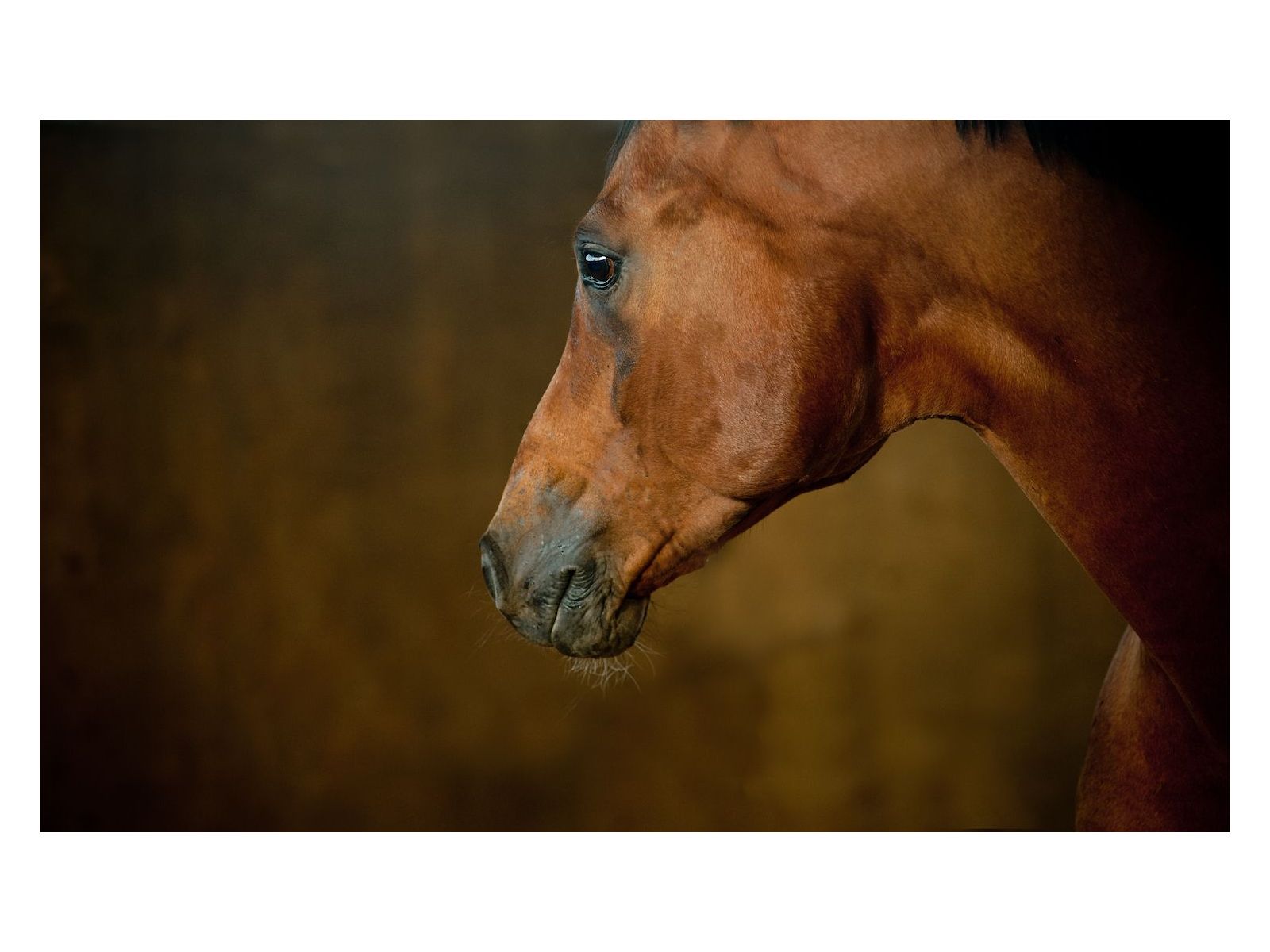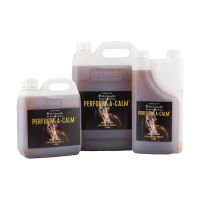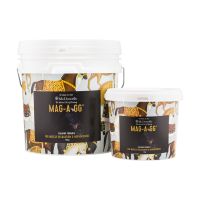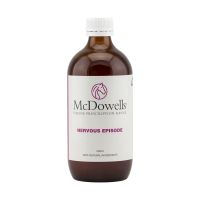What sets performance horses apart from the average riding horse is their intelligence, beauty and sensitivity. They really are a professional riders dream - but for the amateur rider these beautiful horses can be a handful!
Often sensitivity is interpreted as anxiety. Poor training methods and forced training all will impact a sensitive horse and can lead to trauma responses. Trauma leads to anxiety and can make the horse dangerous in some cases. On the other end of the scale are rescue horses- all having trauma and all mistrustful of their surroundings and their handlers.
The actions of sedatives and tranquilizers on the horse's nervous system block nervous system responses, dulling reactions and jumpiness, only for the period the medication is within the horse’s system. This is why they are a "one-time fix" instead of an overall resolution.
Traditional Nervine herbs are a far better alternative for assisting the nervous horse. Herbs can help nourish, strengthen and re-balance the nervous system, aiding an anxious horse in becoming calm and non-reactive to its surroundings. Herbs also often contribute to a permanent change in temperament because a nourished nervous system is a stable nervous system allowing for trust and confidence to blossom.
In dealing with nervous disorders, there are no 'magic' quick fixes. In helping a horse that has a nervous temperament, it's very important to look at the horse's whole history - both health and past experiences such as training, traumas, etc. This provides the relevant information required to combine herbs, homeopathy, nutrition, and perhaps even a change in training regime or routine - all to support in bringing the horse's metabolism back into balance.
Taking the whole horse into account rather than a specific nervous disorder is important. There is a very close relationship between how a nervous system reacts and responds, and how the horse's whole metabolism functions.
An imbalance or nervous system disorder can affect the horse's digestive efficiency, thyroid balance, hormones, liver function, spleen function, respiratory efficiency, blood quality, and immunity to infection. These aspects of the horse's metabolism must all be brought into balance to help resolve serious nervous system problems effectively.
This is where the advice of a professional herbalist is invaluable in developing a comprehensive program for each individual case.
Nervines
It is not advisable to attempt to treat a horse with a severe problem without professional advice. However, if a horse's nervousness is due to a slight imbalance, feeding him a mix of herbs could provide a long-term solution.
There is a class of herbs called 'nervines' - herbs that have specific actions on the nervous system. Many of the nervines contain high levels of magnesium phosphate - a mineral that has been found to be very important to the health and wellbeing of nerves. Different nervines nourish different aspects of the nervous system; the job of the herbalist is to identify the nervine(s) that will aid the specific aspects of the nervous system affected.
While there are around a dozen nervines that apply to humans, horses have four main ones - there are Valerian, Vervain, Chamomile, and Hops. A horse will not always fit exactly into just one nervous system type, often presenting the major signs of one type primarily, and some secondary signs of one or more of the other three.
The first step in finding the right herbs to treat your horse's nervous disorder is to identify his nervous "types".
The Types
The Valerian Horse
The VALERIAN horse typically holds all its anxiety and tension in the muscles that will always seem a little taut. When frightened, this horse will literally become rigid with fear, with the muscles becoming rock-hard. This is the type of horse at a western trail event or show that appears to be managing all the obstacles and moves on the surface, but a closer look will see the teeth grinding, and gnashing on the bit, and the rider can feel the rigid tension beneath the saddle.
While the Valerian horse typically freezes up with tension rather than bolting, if the horse encounters a series of stressful events, it may just explode with bucking, rearing or taking off.
The herb Valerian is popularly used to help people with sleeping problems, and the application to horses is similar. Even in relatively low-stress situations, the Valerian type of horse has a hard time truly relaxing muscles. When Valerian is given to the horse, it aids in relaxing and re-balancing the nervous system, so the horse is able to relax muscular tension.
The Vervain Horse
The VERVAIN horse's anxiety is processed through the skin, with the horse being very sensitive and twitchy. The Vervain horse is generally very nervous and jumpy, without necessarily being afraid, upset or angry. This is the horse that is constantly agitated and highly reactive, always moving and fidgeting, often seeming almost impossible to make this horse stand still, similar to a human who constantly taps a foot or chews on their fingernails.
Training methods that rely on repetitive exposure to frightening situations to reduce the "spook" in a horse will often backfire with a horse of this temperament. This type is very common among horses who have raced or those of race breeding, as they have been bred to have excess energy that often presents as this fidgety temperament. Due to these traits, the Vervain horse is also more likely to become a crib-biter, weaver or windsucker when kept in a confined space for lengthy periods as an outlet for the horse’s excessive energy.
Giving this horse the herb Vervain re-balances the nervous system to aid in the cessation of the endless fidgeting, moving and jumpiness. This horse will always be sensitive, yet once nervous system health returns, the horse will be able to slow down and concentrate - making it more trainable and therefore more reliable under pressure.
The Chamomile Horse
The CHAMOMILE horse' s anxiety is processed through the digestive system. This horse gets upset easily, almost always presenting with diarrhea or scours when it is nervous or worried. The Chamomile horse may show some signs of external stress similar to the signs of other nervines, however, the horse mainly internalises these. So while it may be a little "spooky", the Chamomile horse's main problems are in the gut. The Chamomile horse may even suffer an attack of colic when under stress, and rapidly loses weight and coat condition in stressful situations.
Helping the Chamomile nervous system type horse with the herb Chamomile, not only re-balances the nervous system, but also helps to maintain the health of the horse's digestive system.
The Hops Horse
The HOPS horse processes anxiety through its head. This horse is easily distracted mentally, seeming constantly scattered and unfocused, and has an incredibly difficult time concentrating. These horses are the "dizzy-lizzies" of the horse world - usually very "busy" in the head, although not necessarily physically 'hot' to handle and ride. The Hops horse will be difficult to train in the sense that it will not retain things well. With this type of horse, you will find yourself going over the same issues again and again, and the concentration span often seems to be less than 30 seconds.
Giving the herb Hops to this type of horse allows it to calm down mentally and to become focused. In this balanced state, the Hops horse will be able to concentrate on the job at hand, and given the right direction, can shine in its chosen field.
The Passionflower Horse
Passionflower is another herb that has proved to be very effective regarding long-standing nervous habits, but it is usually administered in conjunction with other nervines. Passionflower helps to relax the nervous system and works particularly well, (almost as a "catalyst"), in conjunction with other herbs to facilitate the effect of the "primary herbs".
There is not really a "Passionflower" type, but the herb helps as a facilitator that aids the horse in setting aside previously entrenched reaction patterns and adopt newer more comfortable patterns. Passionflower would be appropriate for the ex-racehorse type, or indeed any horse that has a long history of nervous or "temperament" problems.
Passion Flower's chief asset is that it assists in breaking nervous system habit patterns as opposed to normalizing a particular nervous system type. It is almost always used in conjunction with the dominant nervine.
The Hypericum – St. John’s Wort
HYPERICUM or St. John’s Wort is another Nervine has some application as a nervous system type but is best used in conjunction with other supports. St. John’s Wort can be used externally, and with regulated and small doses, internally.
Once a horse's nervous system type/s becomes identified - giving him the corresponding herb/s will effectively aid in the correction of the imbalance and assist in the cessation of the nervous behaviour. A program with the appropriate herb/s needs to be followed daily, usually for a period of around three months. While an obvious change in behaviour can usually occur in the first month, if the proper herbs are used for the full course of the program, a permanent change can occur.
The herbs Valerian, Hops, Passionflower, St Johns Wart and Chamomile, allow the horse to relax and remove the need for nervous reactions. This results in allowing the nervous system to be “re-educated”, settling into new habits so the horse no longer reacts in the old way.
A horse occasionally may revert to old behaviour patterns after a year or so following a program, because of his nervous system becoming unbalanced. This could be due to numerous factors including environmental stress, changes to the horse’s physical environment (a new owner/home), strenuous performance demands, an accident, surgery, or feeding/medication with chemicals. If this occurs, a month or so on the horse’s particular “mix” will aid in correcting the relapse of nervous system unbalancing.
However, on occasion, a horse may need to be given herb/s indefinitely.
This horse is the rare exception and could have other contributing crucial factors such as long-ingrained behaviour patterns, a history of abuse, or other metabolic problems that continue to upset the balance of the nervous system.
Further investigation and consultation will be required in these cases.
It is also important to note that if a horse's nervous system is seriously out of balance, there will be physiological implications. These implications could be inefficient digestion or absorption; inability to hold condition; hormonal imbalances; and structural weakness. These complications must be addressed in conjunction with the nervous system by a professional to support a complete return to normal.
The Perform- a-Calm formula is the place I normally start when first approached by an owner of a horse whose performance or health is clearly being affected by anxiety and fear.
Additionally, our special ‘nervous episode’ formula, and mag-a-gg calming formula with the combination of magnesium oxide, brewer’s yeast, chamomile and dandelion can aid with your horse’s nervous system issues and help it keep calm and relaxed.
To discuss a program that is suited to your horse type, book your free consultation by clicking here.





